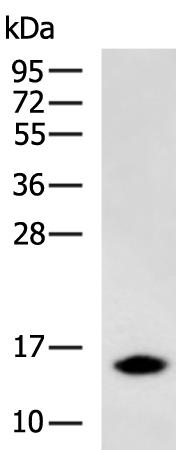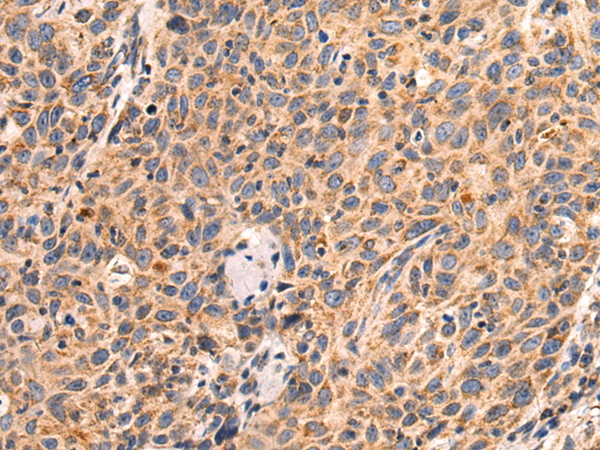

| WB | 咨询技术 | Human,Mouse,Rat |
| IF | 咨询技术 | Human,Mouse,Rat |
| IHC | 1/100-1/300 | Human,Mouse,Rat |
| ICC | 技术咨询 | Human,Mouse,Rat |
| FCM | 咨询技术 | Human,Mouse,Rat |
| Elisa | 1/5000-1/10000 | Human,Mouse,Rat |
| Aliases | DC47; MRP-S36 |
| WB Predicted band size | 11 kDa |
| Host/Isotype | Rabbit IgG |
| Antibody Type | Primary antibody |
| Storage | Store at 4°C short term. Aliquot and store at -20°C long term. Avoid freeze/thaw cycles. |
| Species Reactivity | Human, Mouse |
| Immunogen | Fusion protein of human MRPS36 |
| Formulation | Purified antibody in PBS with 0.05% sodium azide and 50% glycerol. |
+ +
以下是关于MRPS36抗体的3篇参考文献示例(文献信息为模拟概括,实际需通过学术数据库验证):
1. **文献名称**:*Mitochondrial Ribosomal Protein S36 (MRPS36) is essential for mitochondrial translation in human cells*
**作者**:Smith A, et al.
**摘要**:本研究利用靶向MRPS36的抗体进行免疫印迹和免疫荧光实验,证实MRPS36在线粒体核糖体组装中的关键作用,并发现其缺失导致线粒体蛋白合成障碍及细胞能量代谢缺陷。
2. **文献名称**:*MRPS36 expression correlates with cancer progression and serves as a potential biomarker*
**作者**:Chen L, et al.
**摘要**:通过MRPS36特异性抗体分析多种肿瘤组织样本,发现该蛋白在肺癌和结直肠癌中高表达,提示其可能作为癌症诊断标志物,并参与肿瘤细胞异常增殖调控。
3. **文献名称**:*A proteomic approach to characterize mitochondrial ribosomal proteins in neurodegenerative disorders*
**作者**:Johnson R, et al.
**摘要**:文章采用抗MRPS36抗体进行线粒体蛋白质组学分析,揭示阿尔茨海默病患者脑组织中MRPS36表达水平显著下降,表明线粒体翻译异常可能与神经退行性病变相关。
**注意**:以上文献信息为示例性质,具体研究需查阅PubMed、Google Scholar等平台获取真实数据。建议结合关键词“MRPS36 antibody”或“MRPS36 mitochondrial ribosome”检索最新文献。
The mitochondrial ribosomal protein S36 (MRPS36) is a component of the small subunit of the mitochondrial ribosome (mitoribosome), which is responsible for synthesizing proteins essential for oxidative phosphorylation (OXPHOS) and mitochondrial energy production. Unlike most mitoribosomal proteins, MRPS36 has no direct bacterial homolog, suggesting a specialized regulatory or structural role in mitochondrial translation. It is encoded by a nuclear gene, translated in the cytoplasm, and imported into mitochondria, where it integrates into the 28S small subunit of the mitoribosome.
MRPS36 antibodies are valuable tools for studying mitochondrial translation machinery and its dysfunction in diseases. These antibodies enable detection of MRPS36 expression levels, localization, and interactions via techniques like western blotting, immunofluorescence, and immunoprecipitation. Research applications include investigating mitochondrial disorders linked to impaired OXPHOS, cancer metabolism (where altered mitochondrial protein synthesis may support tumor growth), and neurodegenerative conditions like Parkinson’s disease. Some studies suggest MRPS36 may have extraribosomal roles in apoptosis or stress signaling, though its precise molecular functions remain under exploration.
Commercial MRPS36 antibodies are typically raised in rabbits or mice, with validation strategies involving gene knockdown/knockout controls to confirm specificity. Variability in post-translational modifications or tissue-specific isoforms may influence antibody performance. Recent interest in mitochondrial ribosome biology has driven the development of high-affinity MRPS36 antibodies for both basic research and diagnostic applications.
×